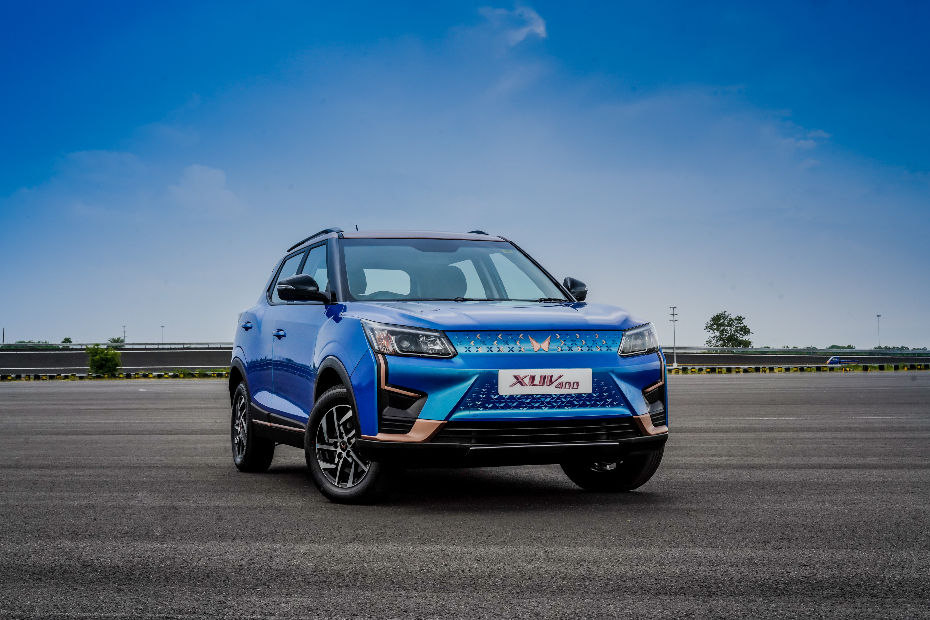Mahindra XUV400 EV Vs Tata Nexon EV - 5 Key Differences Detailed
Modified On Mar 21, 2023 11:14 AM By Tarun
- Write a comment
While their ICE-powered counterparts are direct competitors, will it be the same for their electric versions too?


Mahindra has debuted its first mass-market long-range electric car, the XUV400 EV. Most details such as the design, and specifications like the range, battery and charging time have been revealed ahead of the price announcement next year.
The XUV400 EV is based on the XUV300 but with design updates to the rear that make it longer than 4 metres. It is a direct competitor to the Tata Nexon EV, much like their ICE-powered counterparts. So, here are the five key differences between the two for you to keep in mind:
Dimensions


| Model |
XUV400 EV |
Nexon EV |
| Length |
4200mm |
3993mm |
| Width |
1821mm |
1811mm |
| Height |
1634mm |
1616mm |
| Wheelbase |
2600mm |
2498mm |
| Boot Space |
378 litres |
350 litres |
The XUV400 EV is around 200mm longer than the Nexon EV and even the XUV300. The tax benefits of being shorter than 4 metres in length are applicable only for ICE-powered vehicles and not for EVs. So, the XUV400 gets a redesigned rear profile and bumper which increases its length. It gets a bigger boot too but no changes are made to its wheelbase and in-cabin space. In other aspects, the XUV400 EV is sized very similarly to Tata’s electric SUV.
Also Read: Mahindra XUV400 EV: Price Announcement, Test Drives, Bookings And Delivery Timelines Detailed
Battery And Range


| Specs |
XUV400 EV |
Nexon EV Prime |
Nexon EV Max |
| Battery Capacity |
39.4kWh |
30.2kWh |
40.5kWh |
| Range (ARAI-claimed) |
456 kilometres |
312 kilometres |
437 kilometres |
The XUV claims to offer around 20 kilometres more than the Nexon EV Max, with a slightly smaller battery. The Nexon EV Prime’s driving range is far lower than the XUV400 EV and the Nexon EV Max since it gets a smaller battery. The flip side of the smaller battery is that it is more affordable than the other two
In our road tests, the Nexon EV (now Prime) was able to deliver a range of around 211 kilometres on the highway and around 282 kilometres in the city. So, we’re expecting the XUV400 EV to offer an average range of over 350 kilometres.
Electric Performance


| Specs |
XUV400 EV |
Nexon EV Prime |
Nexon EV Max |
| Power |
150PS |
129PS |
143PS |
| Torque |
310Nm |
245Nm |
250Nm |
| 0-100kmph (claimed) |
8.3 seconds |
9.9 seconds |
9 seconds |
The XUV400 EV is the most powerful, the torquiest and also claims to be the quickest electric SUV in this list. The XUV400 EV and Nexon EV Max also feature one pedal driving with the highest level of regenerative braking activated. They both also come with different drive modes to offer a choice of driving experiences between sporty and efficient.
Also Read: World EV Day Special: 5 Key Moments In India's EV Journey So Far
Charging Time


| Charging Time |
XUV400 EV |
Nexon EV Prime |
Nexon EV Max |
| 0-80% (with a 50kW DC charger) |
50 minutes |
60 minutes |
56 minutes |
| Full charge (7.2kW charger) |
6.5 hours |
- |
6 hours |
| Full Charge (3.3kW charger/16A socket) |
13 hours |
8.5 hours |
15 hours |
With a 50kW DC fast charger, the XUV400 EV will juice up from zero to 80 per cent in just 50 minutes, which is better than the other two but not by a lot. With a 7.2kW charger, the Nexon EV Max charges up quicker, but it’s vice-versa with a 3.3kW charger. Since the Nexon EV Prime’s battery is smaller, it just takes 8.5 hours for a full charge from a lower-capacity charging point.
Price Check


| XUV400 EV |
Nexon EV Prime |
Nexon EV Max |
|
| Price |
Rs 17 lakh to Rs 20 lakh (expected) |
Rs 14.99 lakh to Rs 17.50 lakh |
Rs 18.34 lakh to Rs 20.04 lakh |
The XUV400 EV and Nexon EV Max will be priced similarly. The Nexon EV Max tops out at Rs 20 lakh and we’re expecting the same for the XUV400. The Nexon EV Prime will technically be a more affordable alternative to the XUV400 but with over 140km of lesser range.
Read More on : Nexon EV Prime Automatic
9 out of 11 found this helpful















